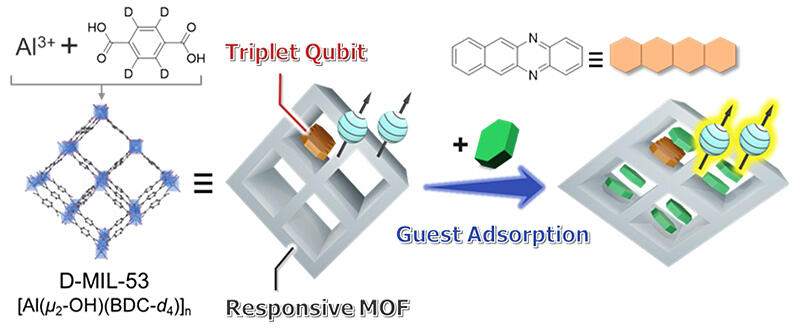Quantum sensing is a technology to perform sensing that utilize the quantum mechanical properties of qubits and that are expected to enable sensing with higher sensitivity and resolution than conventional methods. Among these, the use of electron spins of molecules as qubits has been actively studied due to the high degree of structural freedom and uniformity in molecules. However, most investigations on quantum sensing using molecular qubits have been limited to cryogenic temperatures. Additionally, few strategies have been proposed for using qubits to sense chemical substances, and chemical species that can be sensed are limited.
A research group led by Graduate Student Akio Yamauchi and Associate Professor Nobuhiro Yanai (currently a professor at the Graduate School of Science, the University of Tokyo) at the Graduate School of Engineering, Kyushu University, in collaboration with Chief Engineer Mizue Asada and Team Leader Toshikazu Nakamura at the Instrumentation Center, Institute for Molecular Science; Specially-appointed Assistant Professor Jenny Pirillo at the Graduate School of Engineering, Nagoya University; and Specially-appointed Associate Professor Yuh Hijikata at the Research Center for Net Zero Carbon Society, Institute of Innovation for Future Society, Nagoya University proposed a quantum sensing method that identifies various molecules at room temperature. The results were published in Nature Communications.

Provided by the University of Tokyo
Specifically, the researchers proposed a quantum sensing method for identifying various molecules at room temperature using photoexcited triplet electron spins, which are molecular qubits that can be used at room temperature, and nanoporous materials called metal-organic frameworks (MOFs). Although studies have investigated quantum sensing using MOFs at room temperature, they used normal, non-spin-polarized electron spins, and chemical species that could be detected were limited to specific ions.
By contrast, the present study focused on spin-polarized electron spins generated in the triplet state of organic molecules upon light irradiation. By introducing this into a MOF, which can flexibly change its structure based on the guest, the researchers succeeded in achieving high spin polarization and response to various guests. The retention time (T2) of the quantum superposition state was measured using pulsed electron spin resonance (ESR) spectroscopy for various guests introduced into the MOF, and different T2 values were obtained for each guest. Usually, when a guest is introduced, T2 tends to decrease because of the guest-induced noise generated in the environment around qubits. Furthermore, in this study, for several guests, T2 was longer than that prior to introducing the guest. In particular, for some guests, a very long T2 of approximately 1 µs was obtained at room temperature.
To shed light on this behavior, the percentage of the volume occupied by the guest molecules inside MOF pores was examined, revealing that as the volume occupancy increases, T2 also increases. Simulations of the qubit motion using molecular dynamics calculations suggested that the motion is suppressed at a high-volume occupancy, resulting in a reduction of the motion that causes the loss of the quantum superposition state and an increase in T2.
This study reveals that controlling the mobility of qubits is crucial for quantum sensing at room temperature. Moreover, maintaining a quantum superposition state for long durations is important not only for quantum sensing but also for quantum technology as a whole. Moreover, the findings of this study are expected to be a major step forward in quantum technology using molecular qubits. In the future, chemical quantum sensing is expected to be realized by arranging multiple systems comprising various MOFs and triplet qubits, and recognizing chemical substances based on their responses.
Journal Information
Publication: Nature Communications
Title: Modulation of triplet quantum coherence by guest-induced structural changes in a flexible metal-organic framework
DOI: 10.1038/s41467-024-51715-w
This article has been translated by JST with permission from The Science News Ltd. (https://sci-news.co.jp/). Unauthorized reproduction of the article and photographs is prohibited.




